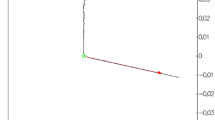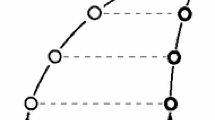Abstract
In a finite-dimensional Euclidean space, we consider a differential game of two persons—a pursuer and an evader—described by a nonlinear autonomous controlled system of differential equations in normal form the right-hand side of which is the sum of two functions, one of which depends only on the state variable and the pursuer’s control and the other, only on the state variable and the evader’s control. The set of values of the pursuer’s control is finite, and the set of values of the evader’s control is compact. The goal of the pursuer is to bring the trajectory of the system from the initial position to any predetermined neighborhood of zero in finite time. The pursuer strategy is constructed as a piecewise constant function with values in a given finite set. To construct the pursuer control, it is allowed to use only information about the value of the current state coordinates. The evader’s control is a measurable function for the construction of which there are no constraints on available information. It is shown that, to transfer the system to any predetermined neighborhood of zero, it is sufficient for the pursuer to use a strategy with a constant step of partitioning the time interval. The value of the fixed partitioning step is found in closed form. A class of systems is singled out for which an estimate of the transfer time from an arbitrary initial position to a given neighborhood of zero is obtained. The estimate is sharp in some well-defined sense. The solution essentially uses the notion of a positive basis in a vector space.



Similar content being viewed by others
REFERENCES
Isaacs, R., Differential Games, New York: Wiley, 1965.
Blaquiere, A., Gerard, F., and Leitmann, G., Quantitative and Qualitative Differential Games, New York: Academic Press, 1969.
Krasovskii, N.N., Igrovye zadachi o vstreche dvizhenii (Game Problems about Motion Encounter), Moscow: Fizmatlit, 1970.
Friedman, A., Differential Games, New York: Dover, 1971.
Hájek O., Pursuit Games, New York: Academic Press, 1975.
Leitmann, G., Cooperative and Noncooperative Many-Player Differential Games, Vienna: Springer-Verlag, 1974.
Krasovskii, N.N. and Subbotin, A.I., Pozitsionnye differentsial’nye igry (Positional Differential Games), Moscow: Fizmatlit, 1974.
Nikol’skii, M.S., One nonlinear pursuit game, Kibernetika, 1973, no. 2, pp. 92–94.
Pshenichnyi, B.N. and Shishkina, N.B., Sufficient conditions for finiteness of pursuit time, Prikl. Mat. Mekh., 1985, vol. 49, no. 4, pp. 517–523.
Dvurechenskii, P.E. and Ivanov, G.E., Algorithms for computing Minkowski operators and their application in differential games, Comput. Math. Math. Phys., 2014, vol. 54, no. 2, pp. 235–264.
Ushakov, V.N. and Ershov, A.A., On the solution of a control problem with a fixed termination time, Vestn. Udmurt. Univ. Mat. Mekh. Komp’yut. Nauki, 2016, vol. 26, no. 4, pp. 543–564.
Petrov, N.N., On the controllability of autonomous systems, Differ. Uravn., 1968, vol. 4, no. 4, pp. 606–617.
Petrov, N.N., Local controllability of autonomous systems, Differ. Equations, 1968, vol. 4, no. 7, pp. 1218–1232.
Narmanov, A.Ya. and Petrov, N.N., Nonlocal problem of the theory of optimal processes. I, Differ. Uravn., 1985, vol. 21. N 4, pp. 605–614.
Narmanov, A.Ya., Stability of completely controllable systems, Differ. Equations, 2000, vol. 36, no. 10, pp. 1475–1483.
Narmanov, A.Ya., On stability of completely controllable systems, Sib. Adv. Math., 2001, vol. 11, no. 4, pp. 110–125.
Bannikov, A.S. and Petrov, N.N., On a nonstationary problem of group pursuit, Proc. Steklov Inst. Math. (Suppl. Iss.), 2010, vol. 271, no. 1, pp. S41–S52.
Petrov, N.N., One problem of simple pursuit with phase constraints, Autom. Remote Control, 1992, vol. 53, no. 5, pp. 639–642.
Petrov, N.N., One group pursuit problem with fractional derivatives and phase constraints, Vestn. Udmurt. Univ. Mat. Mekh. Komp’yut. Nauki, 2017, vol. 27, no. 1, pp. 54–59.
Petrov, N.N. and Solov’eva, N.A., Multiple capture in Pontryagin’s recurrent example with phase constraints, Proc. Steklov Inst. Math. (Suppl. Iss.), 2016, vol. 293, no. 1, pp. 174–182.
Vinogradova, M.N., Petrov, N.N., and Solov’eva, N.A., Capturing two coordinated evaders in linear recurrent differential games, Tr. Inst. Mat. Mekh. Ural. Otd. Ross. Akad. Nauk, 2013, vol. 19, no. 1, pp. 41–48.
Shchelchkov, K.A., On a nonlinear pursuit problem with discrete control and incomplete information, Vestn. Udmurt. Univ. Mat. Mekh. Komp’yut. Nauki, 2018, vol. 28, no. 1, pp. 111–118.
Funding
This work was supported by the Ministry of Education and Science of the Russian Federation within the framework of state order no. 075-01265-22-00 (project no. FEWS-2020-0010) and the Russian Foundation for Basic Research, project no. 20-01-00293. The computing resources of the shared use center “Supercomputer Center of IMM UB RAS” of the Institute of Mathematics and Mechanics of the Ural Branch of the Russian Academy of Sciences were used when performing research.
Author information
Authors and Affiliations
Corresponding author
Additional information
Translated by V. Potapchouck
Rights and permissions
About this article
Cite this article
Shchelchkov, K.A. Estimate of the Capture Time and Construction of the Pursuer’s Strategy in a Nonlinear Two-Person Differential Game. Diff Equat 58, 264–274 (2022). https://doi.org/10.1134/S0012266122020112
Received:
Revised:
Accepted:
Published:
Issue Date:
DOI: https://doi.org/10.1134/S0012266122020112




